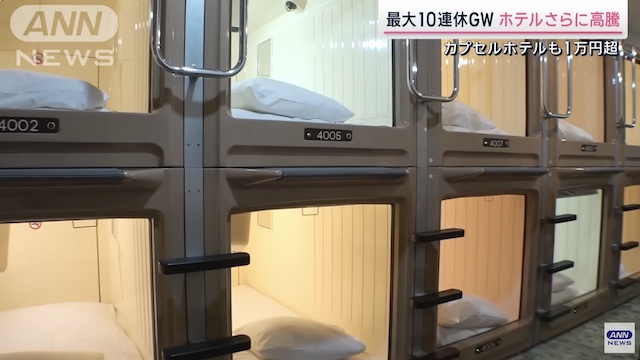TOKYO, Apr 28 (News On Japan) - Tokyo has seen a significant uptick in accommodation prices over Golden Week, with even capsule hotels breaching the 12,000 yen mark per night.

Even the budget-friendly option of capsule hotels witnessed a spike, with "Shinjuku Kuyakusho-mae Capsule Hotel" charging 12,350 yen for a night's stay.
Two university students from Aichi Prefecture commented, "We thought it would be cheaper. We wanted to stay in the same room and had plans for a night of food and fun like a party."
As conventional hotels were too expensive, they resigned themselves to the narrower confines of a capsule hotel.
Director Yuka Shoga noted, "There’s also a significant number of international visitors."
In fact, about half of the guests were foreign tourists. A family from France mentioned, "We wanted to try staying in a capsule hotel. We’ve also stayed in a ryokan, a guesthouse, and used a private lodging."
This trend has made it challenging for Japanese tourists to secure reservations due to the interest of foreign visitors who, despite having the means, opt for the novelty of capsule hotels.
Hideaki Yonemoto, director at Nine Hours, explained, "We adjust our prices according to demand, and as a result, they have risen. Although we hear they’re expensive, we also get feedback that they’re cheaper compared to other hotels in the area."
The cost of staying at business hotels in Tokyo, which was around 6,000 yen two years ago, has now surpassed 18,000 yen, nearly tripling. At Asakusa View Hotel, which boasts the most rooms in Asakusa, about 70% of the guests are foreign tourists.
A couple from the UK stated, "It’s much cheaper than traveling in the USA."
They plan to stay three nights in a 50,000 yen-per-night room. The accommodation costs have risen by about 30% since before the pandemic, but the hotel is nearly fully booked during Golden Week.
Makoto Ikeda, manager at Asakusa View Hotel, said, "We must provide services that justify the price increases, such as increasing staff and enhancing our hospitality."
Enhanced Services Not Just for Overnight Guests
Meanwhile, at the Grand Prince Hotel New Takanawa in Minato Ward, announcer Kengo Nishina reported, "This room is for four people, but the accommodation price has more than doubled compared to last year’s Golden Week."
Despite the price hikes, family room bookings are nearly full. The main drivers behind the increases are high commodity prices and the weakening yen.
Ayu Imai, marketing manager at the hotel, added, "Costs such as utilities, food ingredients, and labor have risen."
To add value, the hotel has enhanced services available not just to overnight guests but also to other visitors. Nishina elaborated, "There is a bonfire by the poolside, and you can relax and enjoy cooking. It’s available to everyone."
From April 27th, the hotel also started offering activities like cotton candy making for children. (Subject to change depending on the situation.)
Imai concluded, "It’s not just about raising prices; providing added value and ensuring our customers feel satisfied is crucial for us."
Source: ANN















